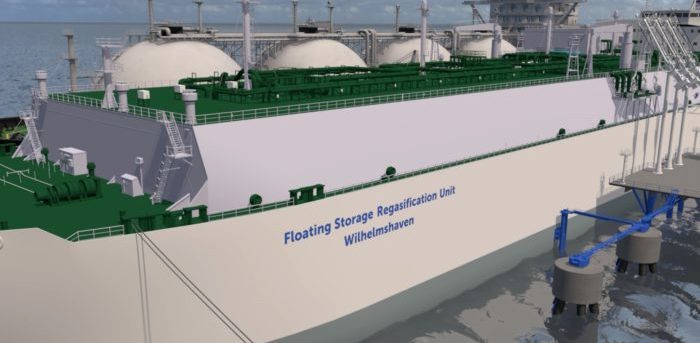ExxonMobil has entered into a Heads of Agreement with German energy company Uniper, to take a substantial share of regasification capacity in Uniper’s Floating Storage and Regasification (FSRU) project Wilhelmshaven. The parties will continue their discussions in the coming months with the goal to enter into binding agreements soon.
The Heads of Agreement is an important step towards the realization of the Wilhelmshaven FSRU project. The FSRU will provide LNG companies from the US, but also other countries from around the world with the opportunity to deliver LNG into the German and European market. This will increase security of supply for customers at competitive price levels. The FSRU technology allows us to realize the project fast and in the most economical way,
…stated Keith Martin, Chief Commercial Officer of Uniper SE.
Uniper plans to enable the FSRU at their site in Wilhelmshaven, Germany, where required infrastructure is already in place. The FSRU has a planned send-out capacity of 10 bcm/a and an LNG storage capacity of around 263,000 m³. The facility could be in operation by the second half of 2022.
Wilhelmshaven is the only German deep-water port and can be reached without any tidal constraints. In addition, the favorable location of Wilhelmshaven with regard to the existing pipeline and gas storage infrastructure supports the realization of the project.
Uniper, as project facilitator, will continue to work closely with the relevant authorities to receive the permits for the operation of the facility and to gather interest for regasification capacity from additional market participants.
In December 2018, Uniper entered into an agreement with Japanese shipowner MOL, which will own, finance and operate the FSRU.
In addition, Uniper recently concluded an agreement with Dutch Titan LNG on the development of the technical and commercial interface for small scale LNG. The FSRU Wilhelmshaven will allow for the loading of bunker barges. Further, the construction of truck loading bays is planned to allow for the onward transportation of LNG by road.
Compared to an on-shore facility, an FSRU can be built cheaper and faster, with reduced risks during the construction period.






























































